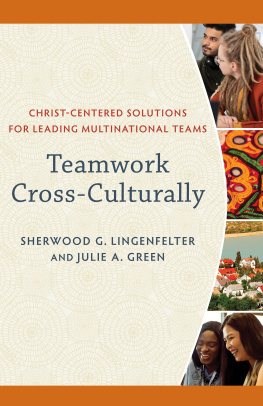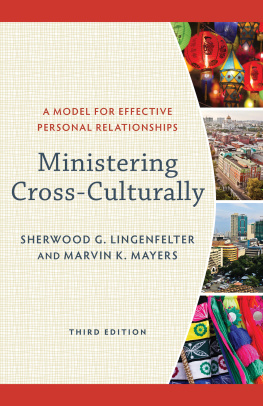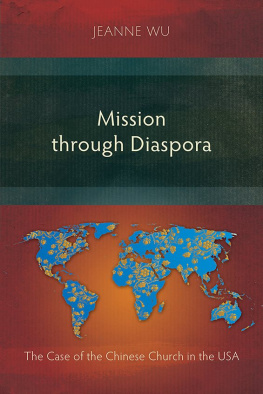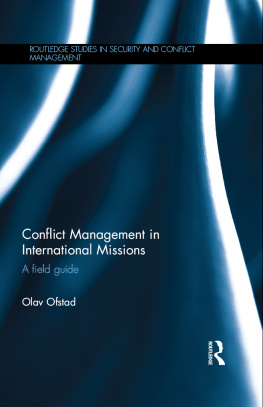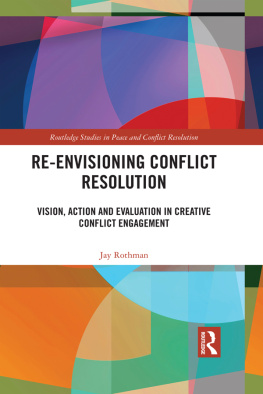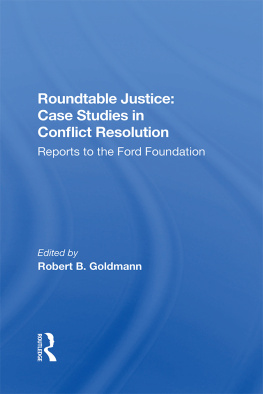Sherwood G. Lingenfelter - Transforming Culture: A Challenge for Christian Mission
Here you can read online Sherwood G. Lingenfelter - Transforming Culture: A Challenge for Christian Mission full text of the book (entire story) in english for free. Download pdf and epub, get meaning, cover and reviews about this ebook. year: 1998, publisher: Baker Publishing Group, genre: Politics. Description of the work, (preface) as well as reviews are available. Best literature library LitArk.com created for fans of good reading and offers a wide selection of genres:
Romance novel
Science fiction
Adventure
Detective
Science
History
Home and family
Prose
Art
Politics
Computer
Non-fiction
Religion
Business
Children
Humor
Choose a favorite category and find really read worthwhile books. Enjoy immersion in the world of imagination, feel the emotions of the characters or learn something new for yourself, make an fascinating discovery.

- Book:Transforming Culture: A Challenge for Christian Mission
- Author:
- Publisher:Baker Publishing Group
- Genre:
- Year:1998
- Rating:4 / 5
- Favourites:Add to favourites
- Your mark:
- 80
- 1
- 2
- 3
- 4
- 5
Transforming Culture: A Challenge for Christian Mission: summary, description and annotation
We offer to read an annotation, description, summary or preface (depends on what the author of the book "Transforming Culture: A Challenge for Christian Mission" wrote himself). If you haven't found the necessary information about the book — write in the comments, we will try to find it.
Revised edition gives readable case studies, more material on conflict resolution and specific applications on how to transform culture from the mission field.
Transforming Culture: A Challenge for Christian Mission — read online for free the complete book (whole text) full work
Below is the text of the book, divided by pages. System saving the place of the last page read, allows you to conveniently read the book "Transforming Culture: A Challenge for Christian Mission" online for free, without having to search again every time where you left off. Put a bookmark, and you can go to the page where you finished reading at any time.
Font size:
Interval:
Bookmark:
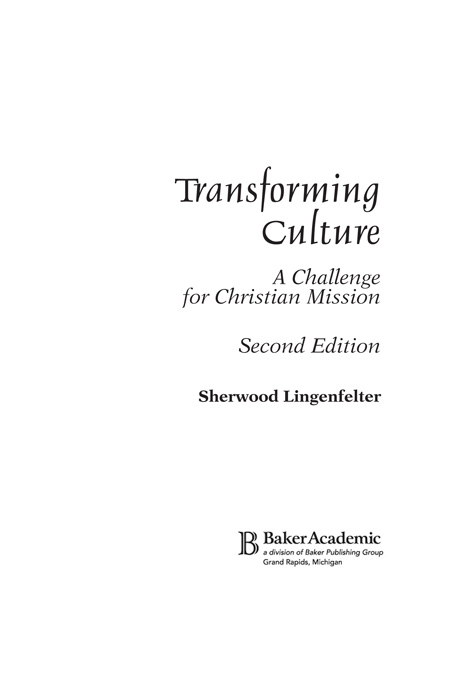
1998 by Sherwood Lingenfelter
Published by Baker Academic
a division of Baker Publishing Group
P.O. Box 6287, Grand Rapids, MI 49516-6287
www.bakeracademic.com
Ebook edition created 2012
All rights reserved. No part of this publication may be reproduced, stored in a retrieval system, or transmitted in any form or by any meanselectronic, mechanical, photocopying, recording, or otherwisewithout the prior written permission of the publisher and copyright owners. The only exception is brief quotations in printed reviews.
eISBN 978-1-4412-0586-5
Library of Congress Cataloging-in-Publication Data is on file at the Library of Congress, Washington, D.C.
Scripture taken from the Holy Bible, New International Version . NIV . Copyright 1973, 1978, 1984 by Biblica, Inc. Used by permission of Zondervan. All rights reserved worldwide. www.zondervan.com
The NIV and New International Version trademarks are registered in the United States Patent and Trademark Office by International Bible Society. Use of either trademark requires the permission of International Bible Society.
Other versions quoted are the King James Version ( KJV ), the Living Bible ( LB ), the New Jerusalem Bible ( NJB ), the New American Standard Bible ( NASB ), and The New Testament in Modern English (Phillips) .
Library of Congress Cataloging-in-Publication Data is on file at the Library of Congress, Washington, DC.
To
Dr. Judith E. Lingenfelter,
who for thirty-six years has been my partner in ministry,
my confidante and friend,
my colleague and professional adviser,
the mother of my children,
and my courageous, patient, enduring, and beloved wife.
For because of our faith, he has brought us into this place of highest privilege where we now stand, and we confidently and joyfully look forward to actually becoming all that God has had in mind for us to be. (Romans 5:12 LB )
Contents
Preface
T he second edition of this book has been substantially revised. The first chapter reflects my growing understanding of the nature of culture as both our palace and prison. The second chapter is new and, I hope, much more accessible to the general reader than was its predecessor in the first edition. The middle chapters contain many of the same case studies of conflict, but much of the ethnographic description, which was burdensome to some readers, has been removed. I have omitted the final three chapters of the earlier edition and have written a new concluding chapter that focuses on the biblical challenge of being disciples of the Lord Jesus Christ, living as servants, shepherds, pilgrims, and strangers in a world of diverse and complex cultures.
The case studies presented in this volume are the result of field research that I have done in various settings around the world. I am deeply indebted to Louis and Lisa Shanks, Bob Mantel, and Jay and Beth Grant for their assistance and hospitality during the summer of 1986 as I visited and studied with them in African-American villages in the interior of Surinam. I am indebted to Gordon and Lois Koop, who were my hosts and coworkers for more than three months in 1977 in Brazil and without whose assistance I could not have written the material in this volume on the Deni Indians. The people of the Yap islands in the Federated States of Micronesia have allowed me to study their culture and to live among them for a period of nearly three years since 1967. I am especially indebted to Fran Defngin, Gabriel Ayin, Cyprian Mugunbey, and an elderly couple, Fithin-grow and Marungweg, for their help on Yap culture. Many other Yapese men and women, from whom I have learned much, are too numerous to name here. I am also grateful to many pastor friends in southern California and my colleagues at Biola University, who have helped me to understand the people and culture of middle-class Americans as they relate to other minority groups in the southern California region.
I am especially indebted to people at Biola University for their support in preparing the manuscript. Wendy Walker and Peg Fosmark have typed drafts of the manuscript and contributed to all of the major revisions, including the preparation of the final manuscript for the publisher. I am especially grateful to Clyde Cook, the president of Biola University, who views scholarship as an important part of my work and has freed me to spend time in the summers on the mission field and to continue my scholarship as part of my administrative work as provost.
As is the case in the production of any book, I am deeply indebted to readers who have given me critical feedback. I am particularly grateful to students in my classes who have given me feedback from the first edition, colleagues Ed Harris and Steve Barber, and missionary friends from the Summer Institute of Linguistics in East Africa who have read some of the revised chapters and given helpful suggestions. I hope they find this edition a useful tool for training others.
Transferring or Transforming Culture?
Therefore, I urge you, brothers, in view of Gods mercy, to offer your bodies as living sacrifices, holy and pleasing to Godthis is your spiritual act of worship. Do not conform any longer to the pattern of this world, but be transformed by the renewing of your mind. Then you will be able to test and approve what Gods will ishis good, pleasing and perfect will. (Rom. 12:12)
A few years ago some missionary colleagues and I attended a Sunday morning worship service in a large evangelical church in Cameroons capital city of Yaounde. The African pastors led us in a familiar service, selecting songs from a standard evangelical hymnbook and preaching an inspiring, doctrinally sound message, given in English and translated into French. We missionaries, a few white faces in a sea of black believers, enjoyed the service thoroughly. As I walked away praising God, it suddenly occurred to me that this service was almost identical to those I had experienced in North America. Momentarily stunned, I wondered why I should feel as comfortable in Africa as if I were at home.
A week passed. I traveled to the interior in the northwest province of Cameroon, where I attended another worship service. There, the congregation sang unfamiliar music, the musicians played instruments dissonant and grating to my ears, and, while the pastor read from the King James Bible, he preached in a language foreign to me. Remembering my experience in Yaounde, I thanked God for the unique expression of worship in this African church. As I observed more carefully, however, I discovered many familiar things. These people had constructed a church building with gabled roof and steeple, arranged their benches in rows, and copied the platform and pulpit of a New England church. The men sat on one side and the women on the other, as was common in the home churches of early missionary pioneers. In the order of service only the language and the music were unfamiliar. As I reflected further on this African congregation, I discovered a structure nearly identical to that of the Baptist conferences with which I am familiar in the United States.
Why is it that in the process of establishing churches in non-Western nations we transfer our culture of the church? Can we find a biblical basis for this practice? Are missionaries planting biblically founded indigenous churches, or are they transferring their culture of Christianity to every nation of the world?
In Europe, Latin America, and Asia, I have found in every area a similar pattern of church planting. In North Borneo, the Anglican, evangelical, and Roman Catholic churches are all modeled on patterns brought by missionaries from various denominational and cultural backgrounds. It is difficult to find in the two-thirds world a truly indigenous church. Most churches reflect more the culture of the missionaries who planted them than they do the culture of the new believers.
Next pageFont size:
Interval:
Bookmark:
Similar books «Transforming Culture: A Challenge for Christian Mission»
Look at similar books to Transforming Culture: A Challenge for Christian Mission. We have selected literature similar in name and meaning in the hope of providing readers with more options to find new, interesting, not yet read works.
Discussion, reviews of the book Transforming Culture: A Challenge for Christian Mission and just readers' own opinions. Leave your comments, write what you think about the work, its meaning or the main characters. Specify what exactly you liked and what you didn't like, and why you think so.

